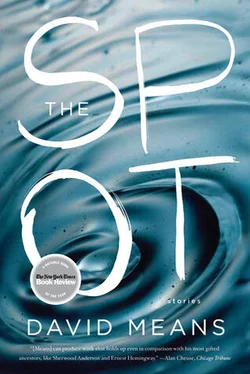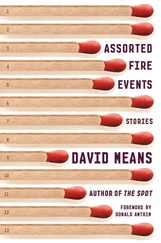David Means
The Spot: Stories
Upstairs he stops for a moment, just to let the tension build, and then he begins again, softer at first, going east to west and then east again, heading toward the Fifth Avenue side of the building, pausing to get his bearings, to look out at the view, I imagine, before heading west, pausing overhead to taunt me before going back into motion for a few minutes, setting the pace with a pendulous movement, following the delineation of the apartment walls — his the same as mine, his exactly the same — and then there is another pause, and I lean back and study the ceiling and hear, far off, the sound of knocking in his kitchen, and then eventually — maybe five minutes, maybe more — he comes back and begins persistent and steady, without the usual aggression, as if he has forgotten me, set me aside, put away his desire for vengeance, offering a reprieve from the nature of his knocking. Maybe a five-minute reprieve, more or less, because it is impossible to guess how long these silent moments might be when they open up overhead, knowing, as I wait, that the knocking will begin again; if not in the form of his tapping heel, then some other kind of knock: perhaps the sound of the hammer he uses to pound the nails (He’s a big nail pounder. He’ll hang pictures at all hours), or the rubbery thud of his printer at work (He’s a big printer, scrolling out documents in the wee hours of the morning, at dusk and at dawn), or the thump of his mattress hitting the slats, accompanied by the wheeze of springs (the wheeze not officially a knocking, most certainly, acting as a kind of arabesque, a grace note to the mattress knocks that arrive after some easeful swaying in his bed). Other sounds, too, that might be included in the knocking family accumulate in my mind this afternoon, an entire history of loud bangs stretching back to the day I moved in two years ago — a cornucopia of various noises that included pot/pan banging, dull plaster thud, bubbling water dribble, the claw scratch titter that continued for a week, the incessant moaning, and the grief-filled swooning sound that arose intermittently and that at first had sounded human but then, over the course of a few days, had taken on a mechanistic, reproduced quality that made me certain it was a recording, a tape loop of some sort. He was that kind of knocker. He was willing to go beyond the call of duty to find a way to make a new noise and to find a way to repeat it endlessly. He was the kind of knocker who would learn a fresh technique, a way of landing his heel on the floor, of lifting his toes and letting them rattle a board, and work with a calisthenic efficiency — all bones and sinew — to transmit the sound via the uncarpeted prewar floorboards, woody, resonant oak solid enough to withstand the harder strikes. Above all, he not only took knocking seriously but went beyond that to a realm of pure belief in the idea that by being persistent over the long term and knocking only for the sake of knocking — in other words, blanking me at least temporarily out of his consciousness, and in doing so forgetting the impulse (our brief meeting last year) for starting in the first place — he could take a leap of faith and increase his level of concentration — pure rapture — and, in turn, his ability to sustain the knocking over the long run. By casting off that original impetus (our brief hall meeting, brushing by each other on that fall afternoon so long ago), he could hit the floor with his heels while I, below, heard him and knew he was doing so driven by a pure faith that went beyond retribution. (I’d tried, long ago, to return the knocks, pounding the ceiling with the broom handle, getting up on a stepladder to follow the footfalls, only to find that as the one below, I was unable to fend off the knocking; because to knock up is not the same as knocking down, and any sound that resides at the feet most certainly isn’t the same thing as a sound coming down upon the head.) Theoretically, there is still debate about the nature of the knock in relation to the listener, of course, and one can easily postulate that a knock not heard is not a knock but rather a sound — pure and simple, and that to qualify as an official knock the sound must not only be heard, but it must also arrive in the ears with an annoying quality. Most certainly, there are gentle knocks, sweet knocks, but those usually fall into the category of soft rappings: the latenight arrival, the lover-to-lover, message-through-the-wall (often adulterous) tap; the old-school, salesman-at-the-door, Fuller Brush five-knuckle rap — a deep anachronism now, replaced long ago by the doorbell, of course, which, in turn, has been replaced by the phone ring. To the receiver of the knock, all theories, no matter how plausible and how sensible, are destroyed by the sound itself. Imaginative capacities gather around the knock. A hammer against a nail, sharp and persistent, goes on a beat too long, pounding and pounding over the course of an entire evening, with metronomic precision. The rounded edge of a sap — lead in leather — being slapped overhead against the floorboards, making a blunt rubbery tap with a leathery overtone. A piercingly sharp metallic tap, not too loud and not too soft, coming out from under the casual noise of a summer afternoon — the roar of traffic on Fifth combined with high heel taps, taxi horns, and the murmur of voices — with a hauntingly pristine quality, the sharp end of a walking stick with a tin tip. A swishing sound stretching from one side of the head to the other arriving one afternoon — again, many of these knockings come late in the day when he knows, because he does know, that I’m in my deepest state of reverie, trying to ponder — what else can one do! — the nature of my sadness in relation to my past actions, throwing out, silently, wordlessly, my theorems: Love is a blank senseless vibration that, when picked up by another soul, begins to form something that feels eternal (like our marriage) and then tapers and thins and becomes wispy, barely audible (the final days in the house along the Hudson), and then, finally, nothing but air unable to move anything (the deep persistent silence of loss. Mary gone. Kids gone). One afternoon — as I was remembering how it felt to slide my hand along Mary’s hips, or the way her skin smoothed out around her belly and grew bone hard and then softer and flat until I got to the soft wetness — the sweeping sound began; not a knocking, but simply the sound of a man upstairs cleaning his apartment in the middle of a hot New York afternoon. . a clean, easy sound at first. Nothing to it — no knocking — until my attention was drawn away from reverie (Mary) and I detected within the sound a hardness, a pressing nature, and I became aware — over the course of what seemed to be an hour — that the sound remained just over my head, with a steadiness that went beyond the nature of the task. There was keen deliberateness. He was going to sweep his way through the floor, the joists and plaster. At some point the sweet, even anachronistic, broom swish had shifted to knock mode, not so much the actual sound — because that was simply vibrations in the air — but rather the inherent pacing and gestural qualities in the way the sound produced itself: the intent behind the gesture had at some point gone from the sweeping itself to the sound that the act made, so that it was clear to me below that what had started out as a normal cleaning routine had at some point, perhaps in response to my moaning and occasional shouts up at the ceiling between sweeps, shifted over to knocking. In other words, at some point his desire to sweep morphed into a desire to knock. Another example: One relatively quiet afternoon — just the dull murmur of televisions going on all sides, the occasional voice in the air shaft — my friend upstairs decided to hang a picture of some kind, or to pound a nail for some other reason (is there another reason?), and he began with the occasional tap, teasingly working the point into the plaster.
Читать дальше












